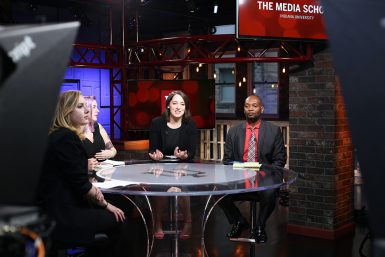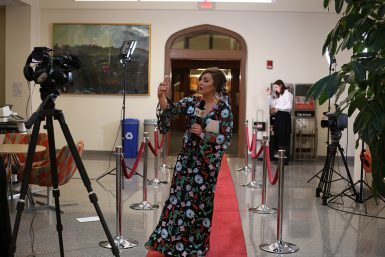School celebrates Oscar night

The Franklin Hall Commons was decked out with lights, cameras and even its very own red carpet to host Oscar night Feb. 26 in the Franklin Hall commons.
Students wore their finest threads and rooted for their favorite contenders as the show unfolded on the big screen, and panelists discussed everything from predicted winners to #OscarsSoWhite. The Media School’s Graduate Student Association organized the event.
Sheila Reilly and Sierra Hignite, co-hosts for IUSTV’s entertainment news show, What’s Up Weekly, were dressed in red-carpet-ready gowns and chatted on Facebook Live with other attendees.
The panel preceded the red carpet event. Doctoral student Megan Connor moderated the discussion, which featured students Leah Dajches, James Gilmore, Kate Halliwell and Andre Seewood as panelists. They discussed the likelihood that the Oscars, particularly the acceptance speeches, would turn political due to the recent election of Donald Trump and his controversial decisions thus far.

Doctoral candidate Gilmore said he didn’t think anyone would be allowed to get too political.
“The Oscars tend to frown on political moments, but I’ve heard a lot of cryptic comments,” he said. “I think any political talk will be an orchestrated political moment. And in a way, politics is inescapable.”
But it wasn’t just the current administration predicted to spark political discussion. The panelists predicted the issue of a systemic underrepresentation of black nominations, which resulted in the popular hashtag #OscarsSoWhite last year, would be carried into this year’s conversation.
“The #OscarsSoWhite conversation has not gone away,” said Seewood, a Ph.D. student focusing on race in media, and film and music production. “The academy is organized in such a way that it is harder for black people to win. They have added new members but the rules have not changed.”
African Americans aren’t the only minority group underrepresented in the movie-making industry and the awards circuit. Dajches said women have about 2 percent less representation in behind-the-scenes nominations at this year’s Oscars. Halliwell added that this is more of a Hollywood problem than an awards problem.
“It’s been shown that female directors and screenwriters and producers have been systematically rejected by studios,” she said.

The panelists also mentioned that several other minority groups have been repeatedly overlooked in films, citing that Dev Patel, who was nominated for best actor, is only the second Indian man to be up for such an award.
“The question becomes how do the problems of the academy help us understand the issues of the bigger industry,” Gilmore said. “They are one in the same, and the issues can’t be solved at this table.”
The panel also discussed favorite award contenders and chatted about how they think the awards have changed and what impact those changes have on society. Although there was debate on who deserved to win and what the Oscars, and the industry in general, had to work on most, all agreed that, even after 89 years, these awards are significant and important part of the film industry.
“Hollywood uses this ceremony to say where their focus is today and where they are going,” said Gilmore. “It is also a chance for people in the industry to show up and say where they are coming from, too.”
More:

